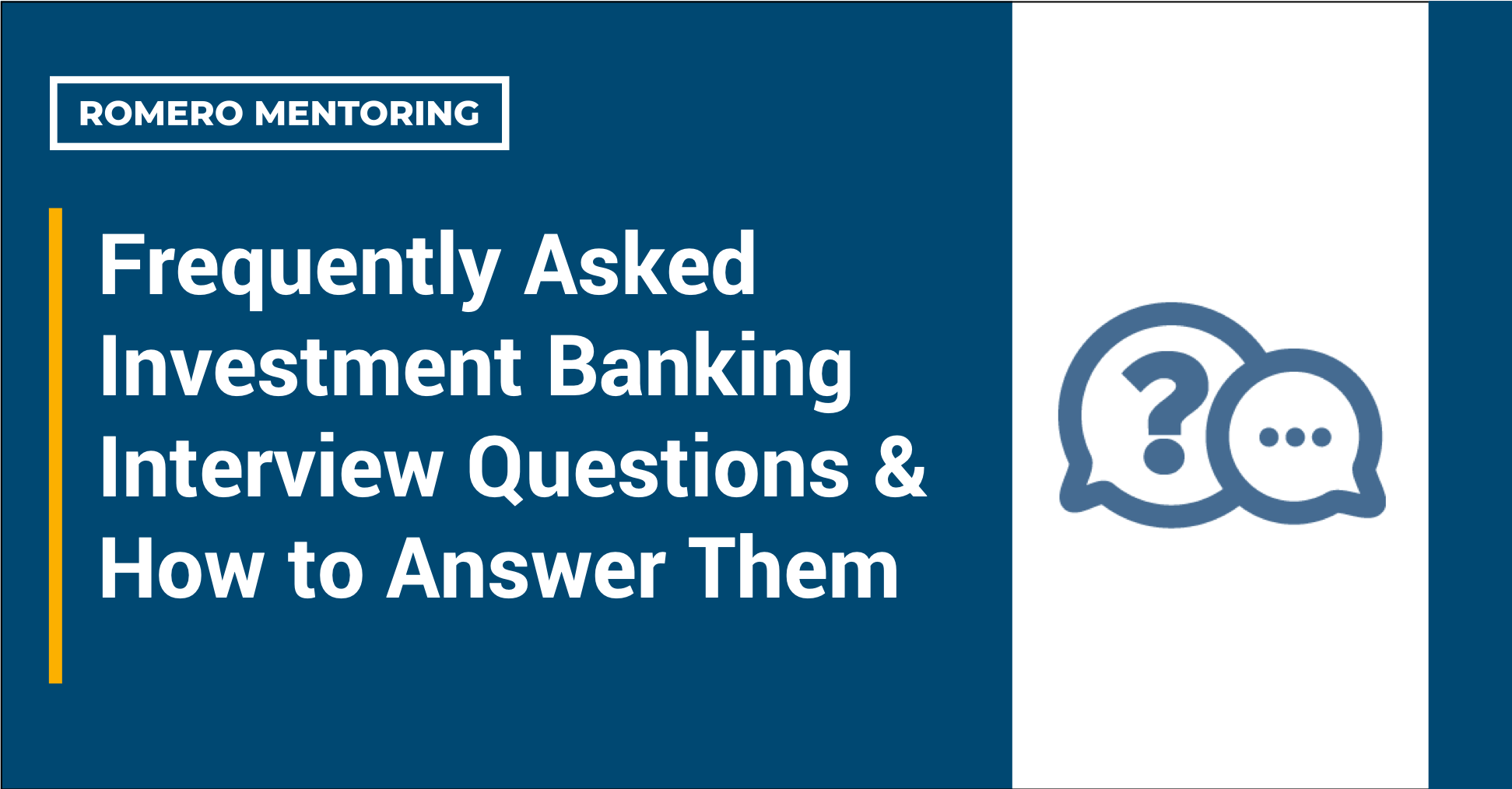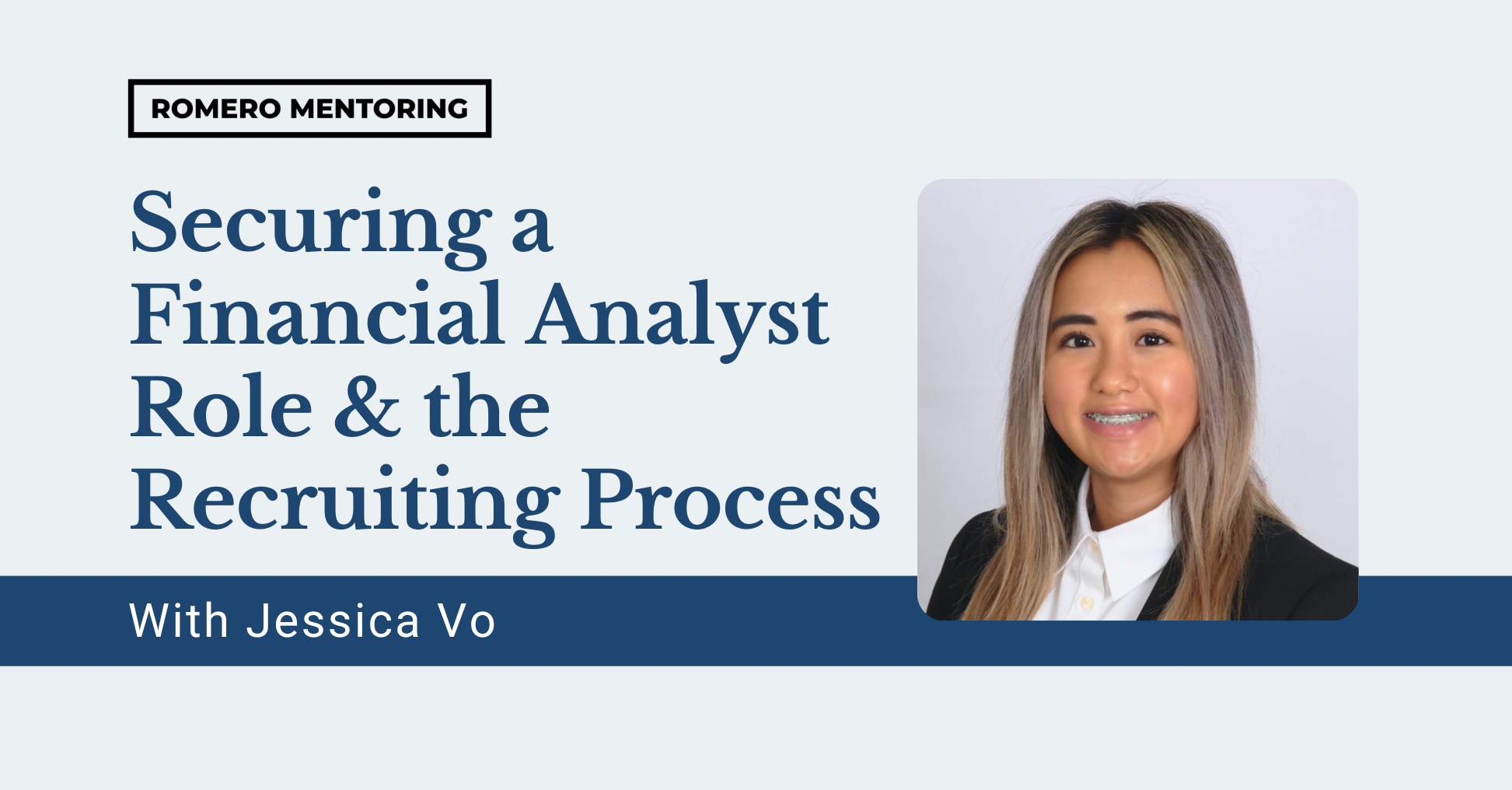Nearly all job openings come with an interview or a set of interviews, depending on the application policy of the company. This includes investment banking analyst/associate positions, which are generally always available. To this end, below is a guide that covers the most frequently asked investment banking interview questions. Nine questions have been listed, along with proposed responses, to provide you with insight into how you should answer these or similar questions in an interview situation. Let’s get started.
Investment Banking Interview Questions
Why investment banking?
If anything is certain, it’s that you’ll need to answer this basic investment banking interview question. It may seem like an easy one, but employers always get the same generic response of “I want to grow in the investment banking world and think this is the best way to get my foot in the door.”
This is a good reply, but not great.
A better response is more personal and will dive into what really motivated you to pursue investment banking as a career path.
Say something like this instead: “I used to work in marketing, and the firm I worked for was acquired by another company. It was interesting to see the changes that took place after the acquisition. My salary was increased, but I watched a lot of my coworkers get let go. After seeing this, I decided to get my MBA and venture into finance. M&A seems like something I would be interested in after seeing firsthand how M&As affect companies.”
What is investment banking?
This is another simple question that, believe it or not, many don’t answer correctly. Make sure to respond like this:
“Investment banking evaluates valuable investment opportunities to increase a corporation’s or client’s revenue. Different companies pool their shares in the investment bank. After this, the investment bankers are the intermediaries of the companies to sell their shares to the investors. On the buyer side, it can be an individual or a company that buys a company’s shares.”
What is an equity investment?
This question tackles the technical aspects of investment banking. Be sure to answer this question in an authoritative tone of voice to make sure you sound knowledgeable:
“An equity investment is the process of buying the shares of a company in the stock market. For example, if you have bought shares of a company in the stock market, the investment you have made is called an equity investment.”
How will you gauge the value of a company?
When answering this question during an interview, be sure to include at least three ways that one can determine the value of a company. For example:
“There are different approaches that can be used to measure the value of a company. For instance, one can consider or use:
- The value of all the company’s assets
- The company’s revenue base
- Discounted cash flow (DCF) analysis
- Financial formulas
The investment banker usually considers all these factors in their daily processes. After successfully gauging the value of a company, they can make wise investment decisions.”
What is discounted cash flow (DCF) analysis?
“Discounted cash flow analysis is a valuation technique that shows you the future of your investment. It typically projects the value of an investment in the upcoming days. Investment bankers apply this valuation method to make decisions whether the investment is profitable or not.”
Walk me through how you will calculate working capital.
“The mathematical formula for working capital shows the company’s working capital at a particular time. The formula that one should use is as follows: working capital = current assets – current liabilities.”
As an investment banker, which investment do you think is better, equity or debt?
“Equity investment is more volatile than debt investment. While equity investment is more profitable, debt investment is less risky and gives you more consistent returns.
Based on this, I think that the before-investment analysis indicates where you should invest. If the equity investment opportunity is riskier as per analysis, you should go with the debt investment. A company with excellent value happens to be worth more for investment purposes.”
Name and briefly describe three financial statements.
“Three common financial statements include cash flow statements, balance sheets, and income statements.A cash flow statement shows a finance manager the net change in the company’s cash. A balance sheet, meanwhile, delvesinto the assets and liabilities of a company and is used to make various financial decisions regarding investments and other activities. An income statementdisplays the revenues and expenses of a company. It typically gives income figures over a particular period.”
What is WACC? Why is it important for an investor?
“WACC stands for the weighted average cost of capital. It calculates the organization’s capital after proportionally weighing each capital type. The formula used to calculate WACC is as follows: WACC = cost of equity * proportion of equity + cost of debt * proportion of debt (1-tax rate).
WACC represents the cost of an investment for which an investor is going to stake his or her money. After WACC is calculated, the investor can decide whether he or she should invest in a particular opportunity or not.”
What is the difference between commercial and investment banking?
“Commercial banks help their customers make deposits and issues them loans commercially. The investments that a commercial bank issues are recorded as the assets to that bank on their balance sheet.
The investment bank, on the other hand, is an intermediary between investors and companies. Companies pool their shares in the investment banks. Investment bankers calculate the worth of companies by utilizing various valuation methods and provide consulting services to investors, identifying profitable investments for them.”
What is CAPM and what is its purpose?
“CAPM stands for the Capital Asset Pricing Model. This model aims to find the expected return on investment. It is more likely to predict the risk factor associated with an investment.
WACC is most often calculated using this model. Investment bankers use this method to gauge the expectancy of the return on investment, thereby offering better consultancy services to their clients.”
Can you differentiate between enterprise value and equity value?
“The enterprise value of a company determines the amount attributable to all the company’s capital providers, whereas equity value is the amount that is attributable to its shareholders on the shares that were pooled through investment banking.”
What is a merger and acquisition? Why are they important to investment bankers?
“When two companies decide to collaborate and transform their operations into a single entity, it is called a merger. When a larger group takes over a smaller company, it is called an acquisition.
Mergers and acquisitions are essential to investment bankers who provide consulting services to various companies to help them increase their investment opportunities. Mergers and acquisitions of companies are considered one of the best opportunities to attract more investment. Therefore, investment bankers might suggest that their client merge with another company of their type to create better investment opportunities.”
Conclusion
After the interview is over, the interviewer may test your academic-centered skills as well. The questions listed above are specific to the investment banking industry and are frequently asked by interviewers. The answers aren’t meant to be crammed. Instead, make sure you deeply understand them, and if you think of additional information that is relevant feel free to add it to your answers. With preparation and an understanding of the knowledge outlined above, you’ll undoubtedly perform at a high level on all your future investment banking interviews.
Romero Mentoring’s Analyst Prep Program

The Analyst Prep Program teaches the technical and practical skills that investment banks, hedge funds, and private equity & consulting firms look for in a candidate. Students begin with little to no technical skills and develop into fully prepared professionals who can perform as first-year analysts from day one through the program’s training and internship.
About Romero Mentoring
Since 2016, Romero Mentoring investment banking training and internship programs have been delivering career mentoring to job seekers, professionals, and college students pursuing careers in finance. We’ve helped hundreds of students start their careers on Wall Street through our Analyst Prep and Associate Programs. Our graduates work at top-bulge bracket banks and consulting firms, including Goldman Sachs, JP Morgan, McKinsey, and many more.
In just 15-weeks you can become a world-class finance professional with our fully immersive internship and Investment Banking Training Programs.





